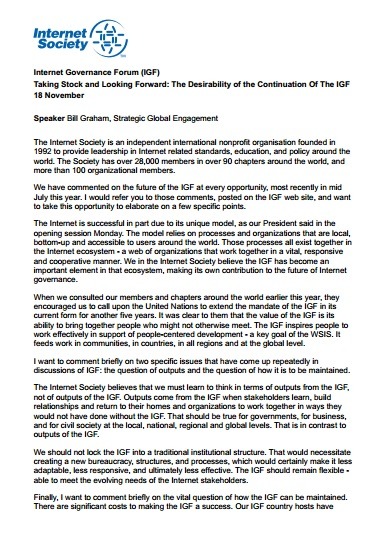Internet Governance Forum (IGF)
Taking Stock and Looking Forward: The Desirability of the Continuation Of The IGF
18 November
Speaker: Bill Graham, Strategic Global Engagement
The Internet Society is an independent international nonprofit organisation founded in 1992 to provide leadership in Internet related standards, education, and policy around the world. The Society has over 28,000 members in over 90 chapters around the world, and more than 100 organizational members.
We have commented on the future of the IGF at every opportunity, most recently in mid July this year. I would refer you to those comments, posted on the IGF web site, and want to take this opportunity to elaborate on a few specific points.
The Internet is successful in part due to its unique model, as our President said in the opening session Monday. The model relies on processes and organizations that are local, bottom-up and accessible to users around the world. Those processes all exist together in the Internet ecosystem – a web of organizations that work together in a vital, responsive and cooperative manner. We in the Internet Society believe the IGF has become an important element in that ecosystem, making its own contribution to the future of Internet governance.
When we consulted our members and chapters around the world earlier this year, they encouraged us to call upon the United Nations to extend the mandate of the IGF in its current form for another five years. It was clear to them that the value of the IGF is its ability to bring together people who might not otherwise meet. The IGF inspires people to work effectively in support of people-centered development – a key goal of the WSIS. It feeds work in communities, in countries, in all regions and at the global level.
I want to comment briefly on two specific issues that have come up repeatedly in discussions of IGF: the question of outputs and the question of how it is to be maintained.
The Internet Society believes that we must learn to think in terms of outputs from the IGF, not of outputs of the IGF. Outputs come from the IGF when stakeholders learn, build relationships and return to their homes and organizations to work together in ways they would not have done without the IGF. That should be true for governments, for business, and for civil society at the local, national, regional and global levels. That is in contrast to outputs of the IGF.
We should not lock the IGF into a traditional institutional structure. That would necessitate creating a new bureaucracy, structures, and processes, which would certainly make it less adaptable, less responsive, and ultimately less effective. The IGF should remain flexible – able to meet the evolving needs of the Internet stakeholders.
Finally, I want to comment briefly on the vital question of how the IGF can be maintained. There are significant costs to making the IGF a success. Our IGF country hosts have made huge financial contributions over each successive IGF – and I would like to take advantage of this occasion to thank Egypt for the wonderful arrangements they have made. Some not-for-profit organizations, including the Internet Society, make regular contributions to the secretariat, as do some businesses and a handful of governments. Others provide in-kind donations, or support attendance at IGF meetings.
We recommend that this voluntary and multi-stakeholder funding model be continued into the next mandate of the IGF. The Secretariat needs greater stability and assurance in order to do its job, and we call on all others from all stakeholder groups to help sustain the IGF materially.
In closing, on behalf of the Internet Society, I want to thank you Ambassador Sha, for the opportunity to participate in this formal consultation. We appreciate the opportunity that is given to us – to collaborate with governments within the United Nations family, and with all others interested in truly making the Internet for all.
